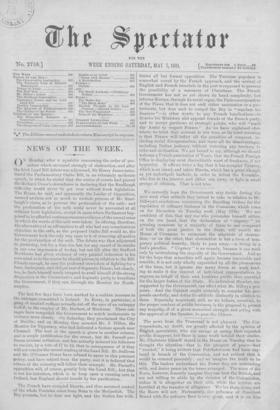We earnestly hope the Government may decide daring the next
week what attitude they intend to take in relation to Mr. Dillwyn's resolutions concerning the Standing Orders for the regulation of ordinary business in the Commons, which come on for discussion on Tuesday week (May 17th). We are confident of this, that any one who persuades himself either, on the one hand, that the declaration of " urgency " on pressing occasions by a majority of three to one composed of both the great parties in the State, will enable the House of Commons to surmount the mischiefs of obstruc- tion,—or on the other, that obstruction is but a form of tem- porary political insanity, likely to pass away,—is living in a fool's paradise. " Urgency " is no remedy, because it can work only by neutralising the majority of the Government. And as for the hope that minorities will again become reasonable and sensible, it is not only wholly unjustified by all the phenomena of the time, but it ignores the many forces at work tend- ing to make it the • interest of individual representatives to engross on behalf of their own localities public time essential for the larger duties of the State. No individual Member, un- supported by the Government, can effect what Mr. Dillwyu pro- poses. And the Cabinet ought certainly to consider his pro- posals carefully, and define its attitude distinctly in relation to them. Especially important, and, as we believe, essential, to the proper conduct of public business, is the proposal to permit any majority, if of a given numerical strength and acting with the approval of the Speaker, to pass the Mitre.


































